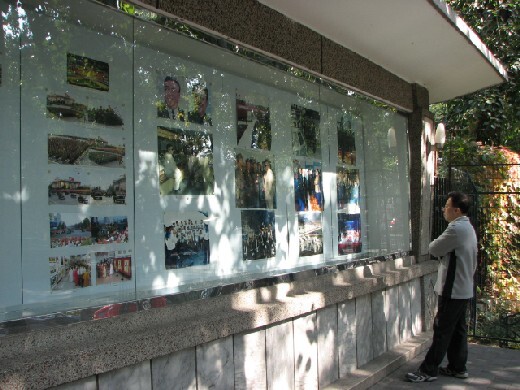hankyoreh
Links to other country sites 다른 나라 사이트 링크
Six-party nations jockey for position following Obama inauguration

Activity on the part of the countries party to the six-party talk on North Korea’s nuclear program is picking up speed in the wake of the inauguration of American President Barack Obama. It is an intense round of wrangling over position so as to not fall behind in the shuffle that is coming with each country’s building of their own strategies to react to the “Obama variable” and in the changing political situation on the Korean Peninsula. There continue to be bilateral contacts, between North Korea and China, North Korea and Russia, and South Korea and Japan, with North Korea engaged in a flurry of activity in recent weeks.
An outstanding example would be how North Korean National Defense Commission Chairman Kim Jong-il spoke with an unusually clear voice when meeting with Chinese envoy Wang Jiarui on Friday. He made it clear he places importance on the North Korea-China relationship by choosing Wang to be the first person he met in the way of diplomacy since the outbreak last September of rumors Kim was in poor health. According to China’s official Xinhua News Agency, Kim told Wang that North Korea “is working for the denuclearization of the Korean Peninsula, hopes to carry on peacefully with the relevant nations, and does not want tension in the peninsula’s political climate.” He went on to say that he thanks China for “its role as the chair of the six-party talks” and that he hopes Pyongyang and Beijing can cooperate in harmony “to progress the six-party talk.” In other words, he was saying he is going to cooperate with the Chinese to advance the talks for the peace and denuclearization of the peninsula. Kim was never someone to be seen often in public in the first place, so it is particularly important that he appeared right after President Obama was inaugurated to demonstrate that he is alive and well while making it known he wants peace and denuclearization, because it could be interpreted to mean he hopes to see the strong, sustained, and direct diplomacy President Obama has promised be implemented as soon as possible.
It would also be worthy to note that Alexei Borodavkin, the deputy minister of foreign affairs of the Russian Federation, his country’s head of delegation to the six-party talks, was in Pyongyang on Tuesday. The meeting might have been about preparing for next month’s working-level meeting in Moscow on a peace and security regime for the Northeast Asian region, but it could just as readily be interpreted as part of an effort by North Korea to compare notes with its traditional allies ahead of earnest efforts at diplomacy with the United States.
Seoul and Tokyo, too, are having their top delegates to the six-party talks meet Thursday to talk about how things might change with the Obama administration. In the United States, on the other hand, the administration there still has not filled all of the important State Department posts, so there has yet to be any specific movement in the same area. It has, however, taken the step of issuing a statement welcoming Kim Jong-il’s comments, and U.S. State Secretary Hillary Clinton calls the six-party talks “essential,” so the Americans are still managing the situation. It can be expected that the United States will take more earnest action once it has its North Korea policy lined up, including the sending of an special envoy to Pyongyang.
Please direct questions or comments to [englishhani@hani.co.kr]
Editorial・opinion
![[Column] Has Korea, too, crossed the Rubicon on China? [Column] Has Korea, too, crossed the Rubicon on China?](https://flexible.img.hani.co.kr/flexible/normal/500/300/imgdb/original/2024/0419/9317135153409185.jpg) [Column] Has Korea, too, crossed the Rubicon on China?
[Column] Has Korea, too, crossed the Rubicon on China?![[Correspondent’s column] In Japan’s alliance with US, echoes of its past alliances with UK [Correspondent’s column] In Japan’s alliance with US, echoes of its past alliances with UK](https://flexible.img.hani.co.kr/flexible/normal/500/300/imgdb/original/2024/0419/2317135166563519.jpg) [Correspondent’s column] In Japan’s alliance with US, echoes of its past alliances with UK
[Correspondent’s column] In Japan’s alliance with US, echoes of its past alliances with UK- [Editorial] Does Yoon think the Korean public is wrong?
- [Editorial] As it bolsters its alliance with US, Japan must be accountable for past
- [Guest essay] Amending the Constitution is Yoon’s key to leaving office in public’s good graces
- [Editorial] 10 years on, lessons of Sewol tragedy must never be forgotten
- [Column] A death blow to Korea’s prosecutor politics
- [Correspondent’s column] The US and the end of Japanese pacifism
- [Guest essay] How Korea turned its trainee doctors into monsters
- [Guest essay] As someone who helped forge Seoul-Moscow ties, their status today troubles me
Most viewed articles
- 1[Column] The clock is ticking for Korea’s first lady
- 2Hong Se-hwa, voice for tolerance whose memoir of exile touched a chord, dies at 76
- 3After 2 months of delayed, denied medical care, Koreans worry worst may be yet to come
- 4[Column] Has Korea, too, crossed the Rubicon on China?
- 5[Correspondent’s column] In Japan’s alliance with US, echoes of its past alliances with UK
- 6US overtakes China as Korea’s top export market, prompting trade sanction jitters
- 7Samsung barricades office as unionized workers strike for better conditions
- 8All eyes on Xiaomi after it pulls off EV that Apple couldn’t
- 9More South Koreans, particularly the young, are leaving their religions
- 10John Linton, descendant of US missionaries and naturalized Korean citizen, to lead PPP’s reform effo